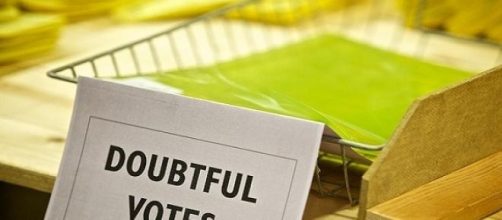Tonight the BBC played host to the final of the televised leaders' debates. David Dimbleby chaired the discussion amongst the leaders of Labour, Plaid Cymru, SNP, UKIP and the Greens. The absence of the incumbent Prime Minister Cameron and Deputy Clegg did not go unnoticed, with Nicola Sturgeon calling it "a disgrace."
The panel was asked to respond to questions from the floor, some of which had come from audience views on Twitter, and Dimbleby clarified that the leaders had not seen them in advance. Questions were on the National Debt, housing, Trident, immigration and a hung parliament.
Nigel Farage secured early cheers from the audience for his ideas of cutting spending but unsurprisingly, he caused the first moment of controversy, accusing the BBC of left-wing bias. Dimbleby countered this succinctly describing how the audience had been put together by a polling organisation.
There were further clashes amongst each of the leaders particularly on immigration which, according to Farage, caused a house to be built every 7 minutes. It led to predictable counters from each of the parties, Sturgeon asking for him not to refer to immigrants as "bogeymen," Bennett and Milliband referring to their own immigrant backgrounds and Wood referring to the problems caused in Wales because of anti-immigration policies.
Milliband manipulated it into a discussion on the NHS, accusing Farage of wanting an American-style insurance based scheme. This brought about a riposte from the UKIP leader of "lying" and caused raised voices between the two leaders, with Bennett even accusing Labour of introducing profit into the NHS. Mr. Dimbleby managed to restore order and introduced the last question, which perhaps had the biggest impact.
The leaders were asked what deals they would make if there was a hung parliament. Wood and Sturgeon both made clear their positions of wanting an end to Conservative rule, with Sturgeon emphasising that she would, "never do a deal with the Tories." Both parties offered the possibility of working alongside Milliband if he could show stronger opposition and not just be, "Tory light." Bennett declared that her party could work with Labour on a "vote-by-vote" basis.
Even Farage admitted he could work with them if they offered a clear position on Europe.
Ed Milliband however stood firm and stated his intention of a majority government, ruling out any coalition. Sturgeon probed further, claiming that the prospect of removing the Tories would be a price worth paying, but Milliband opposed it because of the SNP's stance on a second referendum on Scotland.
Each of the parties will undoubtedly be claiming their own victories, though it felt incomplete without all of the leaders. This prompted Milliband to challenge Cameron to "debate me" in a one-on-one situation and to "let the people decide." It is now only three weeks away until the only poll that matters - the General Election - when the parties will actually find out if they succeeded in getting their message across.

